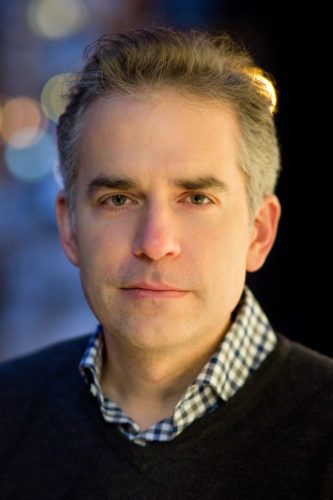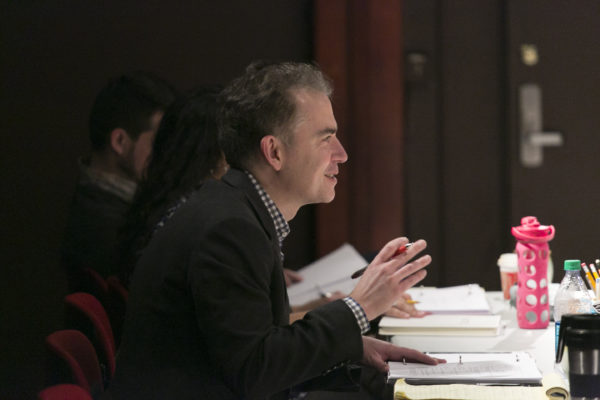Theater Preview: “Buddy” Cianci’s Ghost Returns to Haunt Providence
By Robert Israel
We are definitely feeling a sense of Buddy Cianci haunting us, to be sure. I mean, this theater is the place he visited. He attended many, if not most, of the shows here.

Dramatist George Brant. Photo: Rob Strong.
Vincent A. “Buddy” Cianci, Jr., (1941–2016), radio talk show host, political commentator, public buffoon, served as the 32nd and 34th mayor of my hometown. He commandeered that post ruthlessly for 21 years during a dark chapter in the city’s history. It was a time, to quote poet Philip Levine, that the town was “so ripe with the smell of defeat that its citizens lied about their age, their height, sex, income, and previous condition of anything.” He succeeded lifting their spirits by launching public projects (many of them cosmetic facelifts) that he took sole credit for. He even marketed his own brand of marinara sauce.
Cianci could have easily served as 33rd mayor had it not been for a law that prohibited him from doing so after he pleaded no contest, in 1984, to assaulting Raymond DeLeo, his estranged wife’s paramour, with a fireplace log. (“I’m gonna put a bullet in your head,” he said, scorching DeLeo with a lit cigarette while a Providence Police officer assisted.)
I interviewed Cianci for a newspaper story, chronicling one of his many misdeeds. It sent him into a tirade. He telephoned my publisher, insisting I be fired. Nothing came of his temper tantrum. Not long afterward, he found himself up to his eyeballs in alligators (the Feds had launched “Operation Plunder Dome” – an investigation that led to his downfall). Turns out Cianci, a self-proclaimed “anti-corruption candidate,” was corrupt: in U.S. Federal Court in 2001, he was convicted of racketeering, conspiracy, mail fraud, witness tampering, and extortion, and sentenced to a five-year stint in federal prison.
On September 12, Trinity Repertory Company in Providence will play host to Buddy’s phantom (in the guise of actor Scott Aiello), who tells these and other stories at the world premiere of The Prince of Providence, by George Brant (based on the 2003 selfsame nonfiction book by Mike Stanton). Taibi Magar directs. The production closes just before Halloween, on October 27.
I recently spoke with Brant about his play.
Arts Fuse: For the past 16 years, there has been talk of a film script based on Mike Stanton’s book in the works. Stories in the press have mentioned a number of people interested in developing the project. For instance, Michael Corrente, a Rhode Island–born filmmaker, at one time was rumored to be working with writer David Mamet on the script, but it evidently got scotched. How did you get involved?
George Brant: I had worked with Trinity Rep on a play I wrote, Into the Breeches, so the theater and I have had a close working relationship. My wife worked with them, too, first as a student in the Brown-Trinity Rep program, and later on staff. At that time, I lived in Providence for a total of eight years. I learned that the film rights were not proceeding, and that Trinity had acquired the rights last summer. I was approached to write the play then. It’s been a fairly quick script development process since that time.
AF: Did you adapt Stanton’s book solely for stage, or did you rely on other source materials?
Brant: My process has been to research Buddy, and yes, the primary source is Mike’s book. I also drew from Buddy’s book, from newspaper articles, from the show Crimetown about Buddy. There’s been almost too much to draw from, there’s such a wealth of material written about him.
AF: How is the play structured?
Brant: It’s a two-act play. The first act captures the rise of Buddy in the hardscrabble world of Providence politics. The second act is about his return to the mayor’s office [after the DeLeo assault], and his downfall.
AF: Do you remain true to Buddy’s use of foul language? For example, as referenced in Stanton’s book, Buddy is quoted as telling Alan Hassenfeld, the CEO of Hasbro Toys in Pawtucket: “You make fucking toys. I run a city . . . and the only reason you do that is because your father left you the company, because you’re a member of the Lucky Sperm Club.”
Brant: That particular moment is not captured in the play, but there are other scenes when Buddy’s use of foul language is portrayed. I’d say the play accurately captures his language and mannerisms.
AF: So, in portraying Buddy for the stage, do you try to show all sides of his flamboyant personality?
Brant: Yes, the play supports that point of view. We are all such complicated people, and Buddy surely is a hyper-version of that. He had extremes. There were people that loved him and others that hated him. In the pro column, he truly did love Providence, I believe, and he helped to turn it around. On the other hand, he was famous for losing his temper. The private Buddy was a lot different than his public persona. My challenge is to present all those sides so that you leave the theater, hopefully not only entertained, but also understanding his complicated personality. It is interesting to note that during his indictment, his popularity rating actually went up more than 50 percent. He definitely had a hold on people here. In a sense, he still has a hold on people here.

George Brant in rehearsal. Photo: Heidi Bohnenkamp.
AF: During Buddy’s “princely” reign, he and Trinity Rep enjoyed quite a cozy relationship. How is that cozy history affecting the cast as you rehearse the play?
Brant: We are definitely feeling a sense of Buddy haunting us, to be sure. I mean, this theater is the place he visited. He attended many, if not most, of the shows here. For many years, he and Trinity had a symbiotic relationship. He spoke at fund-raising events. The resident company, for example, every year traipsed down to Providence City Hall to sing “Happy Birthday” to him in his office. To be involved with this theater and a group of actors that knew him, that had such a close relationship with him, is eerie. At the same time, it’s too good to pass up.
AF: It must be creepy, indeed, to be working on a play in a theater he actually visited often.
Brant: Yes, it is both creepy and inspiring. We’ve been working on the play in the rehearsal room upstairs from the theater itself, but we’ll be heading down to the auditorium this week. I wouldn’t be surprised if we sense his ghost during the run when we look down at row E, where he used to sit. He’s had a strange presence here.
Robert Israel writes about theater, travel, and the arts, and is a former member of Independent Reviewers of New England (IRNE). He can be reached at risrael_97@yahoo.com.

